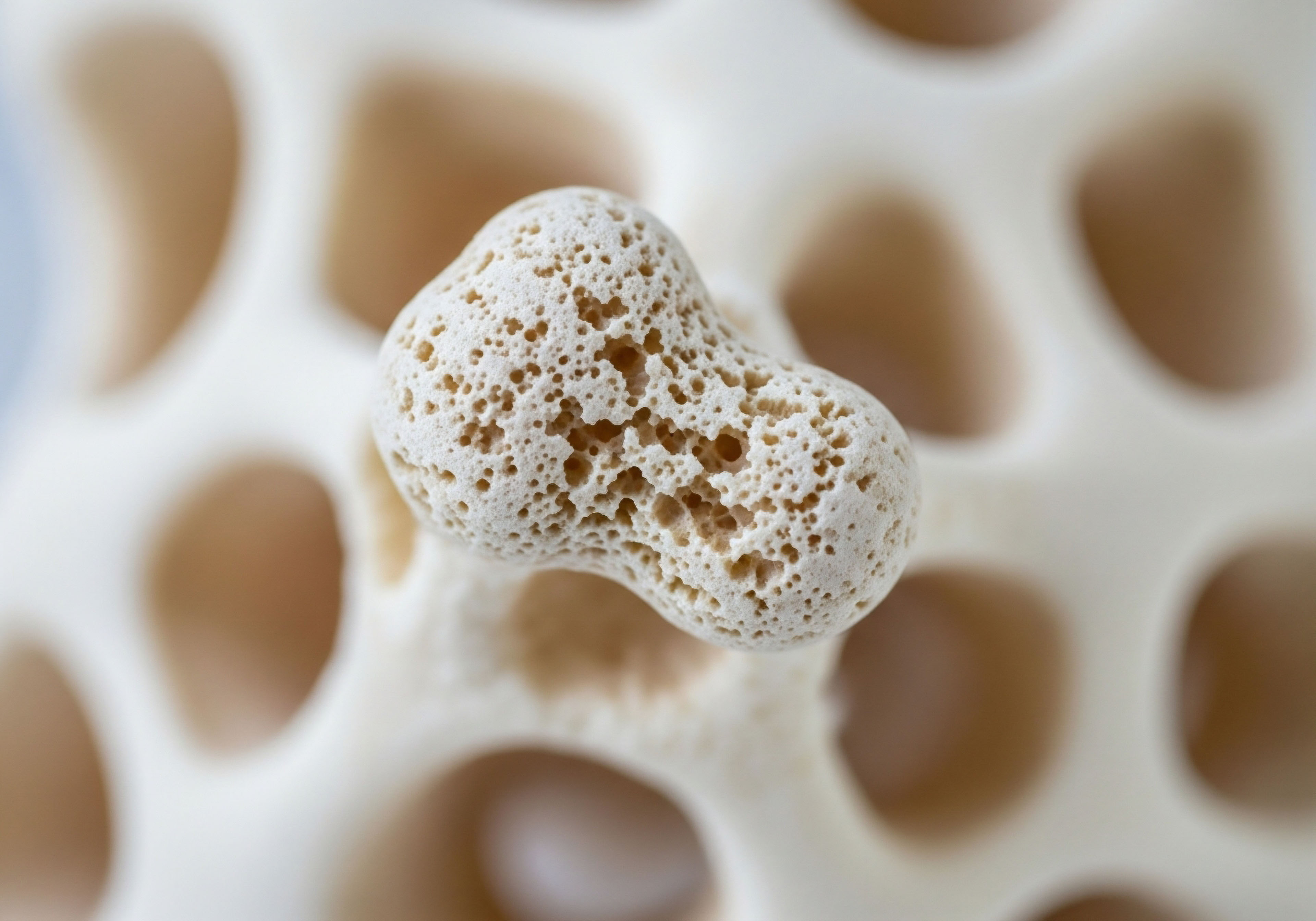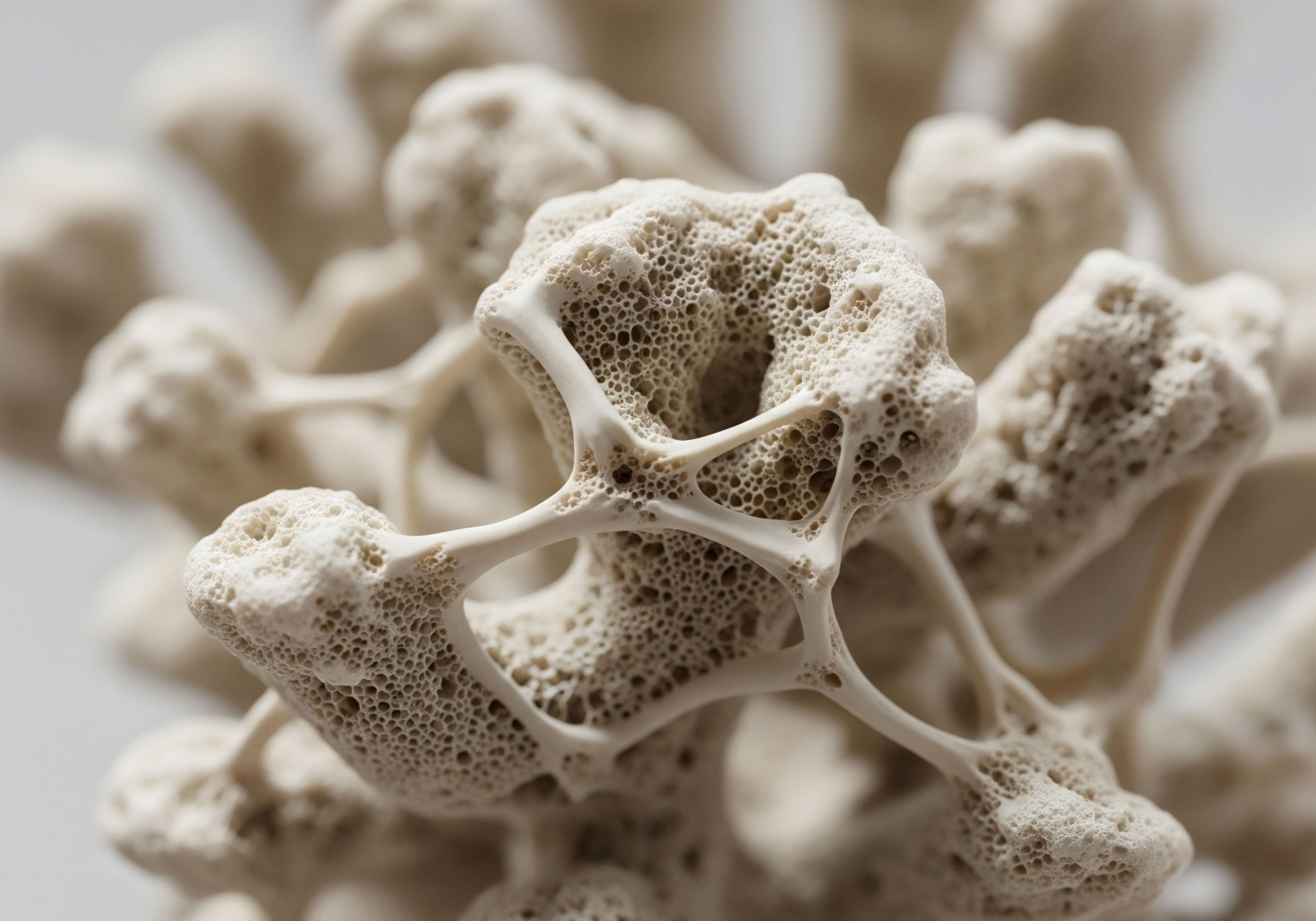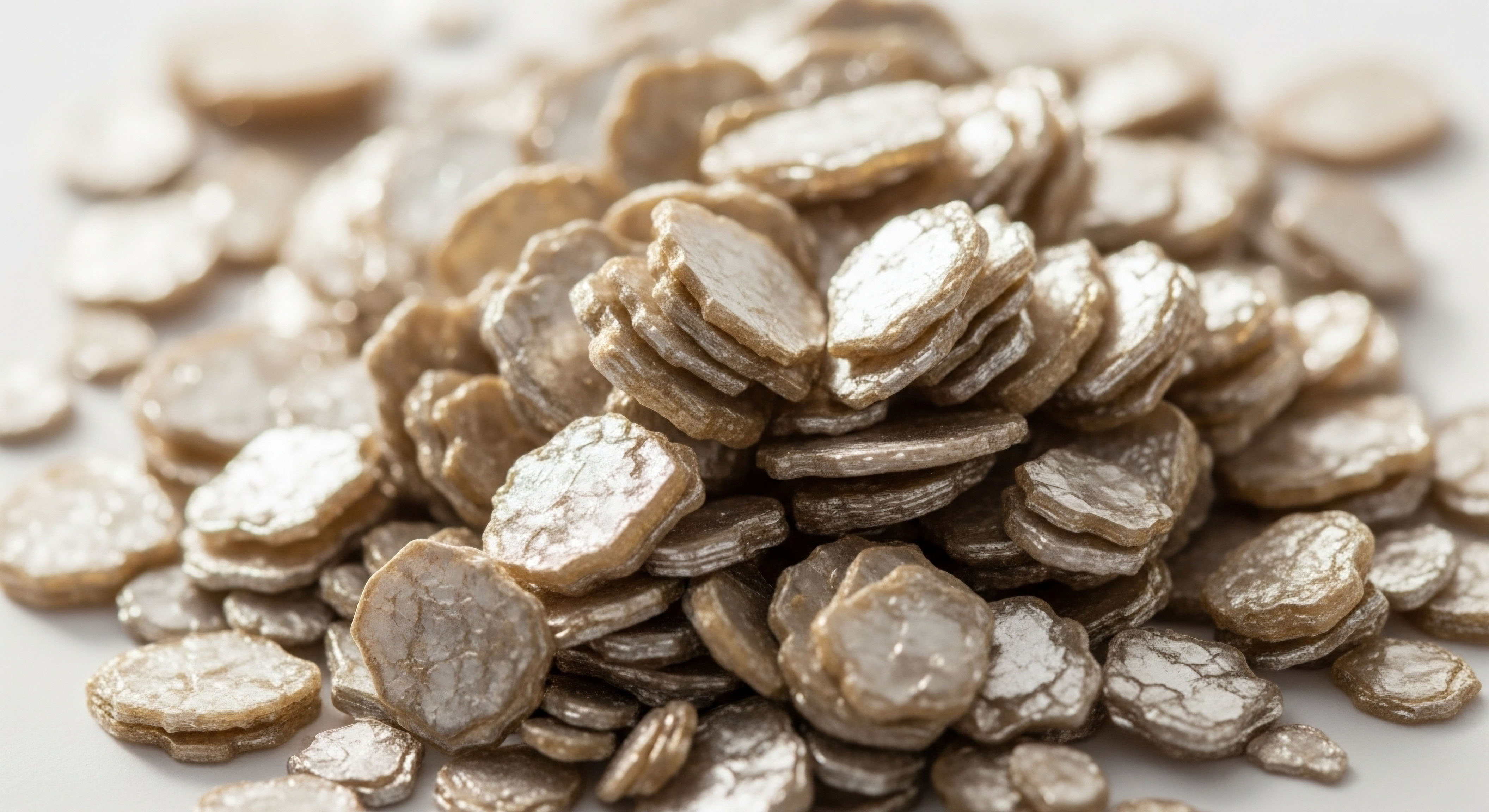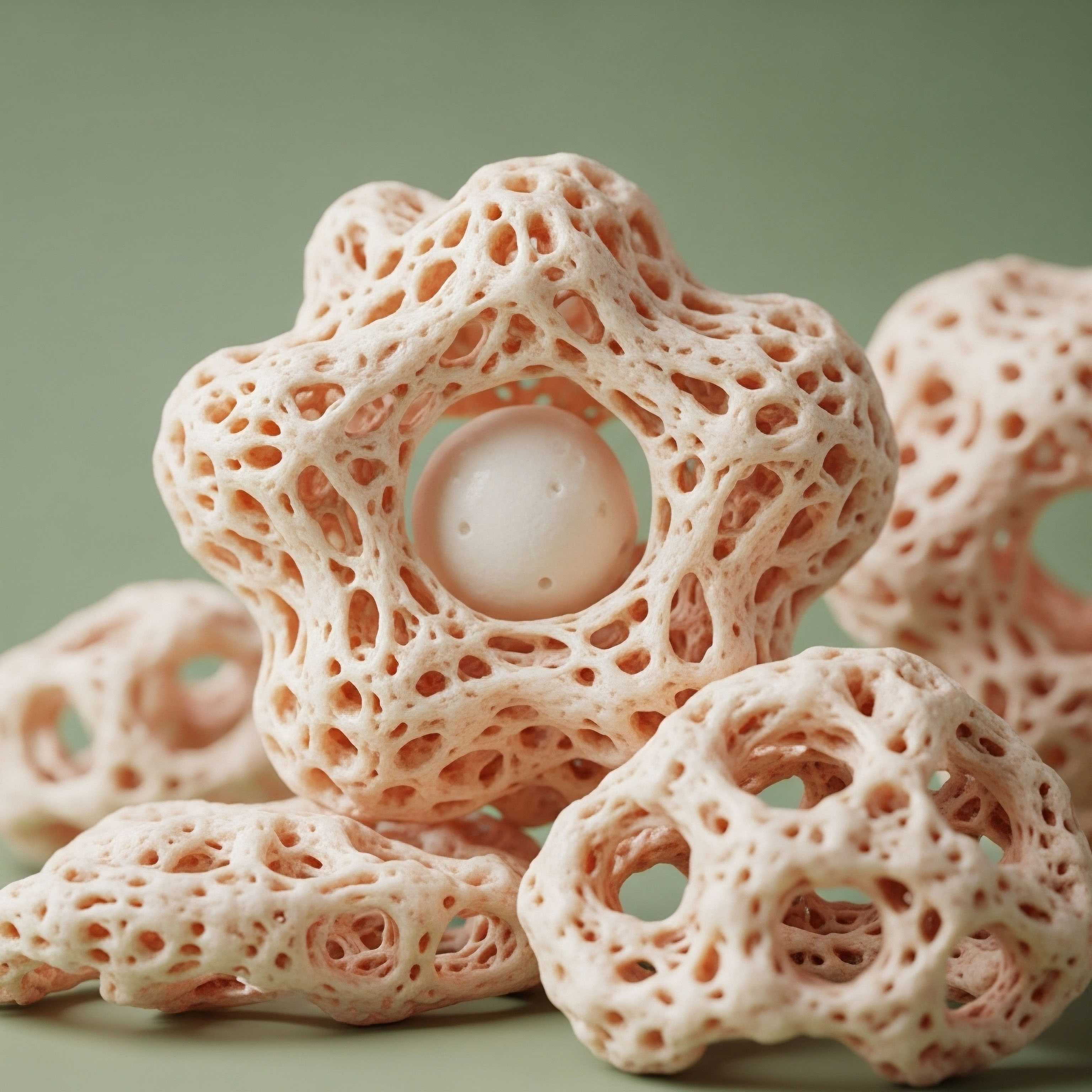

The Engine’s Essential Spark
Within the complex architecture of male physiology, a single mineral acts as a fundamental catalyst for peak performance ∞ Zinc. This trace element is far more than a dietary footnote; it represents a critical component governing the intricate symphony of hormonal balance, metabolic precision, and robust cellular function. Understanding its role provides a profound insight into optimizing the masculine biological framework.
The endocrine system, a sophisticated network of glands and hormones, orchestrates vitality. Testosterone, the primary male androgen, governs muscle accretion, bone density, libido, and cognitive drive. Its production relies heavily on the consistent presence of zinc. Research consistently demonstrates a direct correlation between serum zinc levels and total testosterone concentrations.
A deficiency in this mineral can significantly impede testosterone synthesis, leading to a cascade of suboptimal physiological states. Supplementation, particularly in individuals with existing deficiencies, reliably elevates testosterone levels, restoring the foundational hormonal equilibrium.

The HPG Axis and Hormonal Command
The Hypothalamic-Pituitary-Gonadal (HPG) axis functions as the central command system for male reproductive and endocrine health. This axis involves a delicate feedback loop ∞ the hypothalamus releases gonadotropin-releasing hormone (GnRH), which prompts the pituitary gland to secrete luteinizing hormone (LH) and follicle-stimulating hormone (FSH). These gonadotropins then signal the testes to produce testosterone. Zinc plays an indispensable role at multiple points along this axis. Its absence compromises testicular steroidogenesis, the process through which the testes synthesize testosterone.
Moreover, zinc acts as a vital cofactor for 5α-reductase, an enzyme responsible for converting testosterone into its more potent form, dihydrotestosterone (DHT). This enzymatic conversion is essential for various androgen-dependent processes, including prostate health and the development of secondary sexual characteristics. Zinc deficiency directly impairs this conversion, impacting the overall androgenic environment.
“Zinc deficiency reduces testosterone levels and zinc supplementation improves testosterone levels. Serum zinc was positively correlated with total testosterone, and moderate supplementation plays an important role in improving androgen.”

Beyond Hormones ∞ Performance and Protection
The impact of zinc extends far beyond hormonal regulation, reaching into the very core of male performance and resilience. It is a powerful agent in maintaining cellular integrity and protecting against oxidative stress. Oxidative stress, an imbalance between free radicals and antioxidants, contributes to cellular damage and accelerates physiological decline. Zinc contributes to the body’s antioxidant defense mechanisms, safeguarding delicate tissues, including those vital for sexual function.
Studies indicate that zinc supports sexual performance and erectile function by mitigating oxidative injury and promoting the healthy regulation of circulating testosterone. This protective capacity translates into tangible improvements in physiological responsiveness and overall male vitality.
- Zinc deficiency directly lowers testosterone levels.
- Zinc is crucial for testosterone biosynthesis, storage, and secretion.
- It functions as a cofactor for the conversion of testosterone to DHT.
- Zinc supports the HPG axis, influencing LH and FSH responses.
- It protects against oxidative stress, supporting sexual and erectile function.


Reclaiming Biological Potency
Understanding zinc’s profound influence on male physiology leads to the crucial question of implementation. Reclaiming optimal biological potency requires a strategic approach to ensure adequate zinc status. Many individuals operate with suboptimal zinc levels, a consequence of modern dietary patterns and absorption challenges. This subclinical deficiency erodes the foundation of peak performance.

Strategic Dietary Sourcing
The primary pathway to elevating zinc levels begins with intentional dietary choices. Nature provides potent sources, and integrating these into a daily regimen forms the bedrock of an optimized nutritional strategy. Prioritize foods with high bioavailability and concentration.
- Oysters ∞ Consistently rank as the most abundant source of dietary zinc.
- Red Meat ∞ Beef, lamb, and pork offer significant quantities.
- Poultry ∞ Chicken and turkey contain valuable zinc.
- Legumes ∞ Lentils, chickpeas, and beans contribute to zinc intake.
- Nuts and Seeds ∞ Pumpkin seeds, cashews, and almonds are excellent sources.
- Dairy Products ∞ Cheese and yogurt provide a moderate amount.
A diet rich in these elements naturally supports robust zinc levels, creating an internal environment conducive to hormonal balance and systemic health.

Precision Supplementation Dynamics
While dietary intake is foundational, modern living often presents challenges to achieving consistent optimal micronutrient status. Strategic supplementation offers a precise method to bridge any gaps. It ensures the body receives the necessary raw materials for peak function. However, the dynamics of zinc supplementation demand a meticulous approach.

Dosage and Bioavailability
The recommended daily intake for adult men typically sits around 11 milligrams. Supplementation for individuals with identified deficiencies may involve higher, medically guided doses. Crucially, the form of zinc matters for absorption. Zinc picolinate, zinc citrate, and zinc gluconate demonstrate superior bioavailability compared to other forms. This enhanced absorption translates to more effective cellular uptake and utilization.
The body cannot store zinc in large reserves, necessitating a consistent daily intake. This continuous supply ensures the ongoing support for enzymatic processes and hormonal pathways.
“The study participants included men whose daily diets included the recommended amounts of zinc. Giving these men zinc supplements did increase their testosterone levels.”
The interplay of zinc with other minerals, particularly copper, warrants attention. High doses of zinc can influence copper absorption. A balanced approach often involves monitoring both zinc and copper status to maintain a harmonious micronutrient profile.

Identifying Deficiency
Recognizing the signs of zinc deficiency is the initial step toward informed intervention. These indicators extend beyond hormonal imbalances, encompassing a spectrum of physiological signals.
Common markers of suboptimal zinc status include ∞
- Reduced libido or sexual function.
- Impaired immune response and frequent illness.
- Fatigue and low energy.
- Suboptimal wound healing.
- Hair loss.
- Changes in taste or smell perception.
A medical professional can conduct targeted assessments, including blood or hair mineral analysis, to confirm deficiency and guide personalized supplementation protocols. This diagnostic precision ensures interventions are both effective and safe.


The Future of Vitality Unfolds
The strategic integration of foundational minerals like zinc represents a proactive stance toward lifelong vitality. This is a journey toward sustained excellence, a recalibration of internal systems designed for endurance and peak output. The effects of optimizing zinc status manifest across a timeline, unveiling enhanced performance and resilience.

Immediate Energetic Shifts
Individuals with a significant zinc deficit often report a rapid improvement in subjective well-being and energetic output. Within weeks of consistent, appropriate supplementation, a perceptible shift occurs. Energy levels stabilize, cognitive clarity improves, and a renewed sense of vigor emerges. This initial phase marks the foundational elements of the body’s enzymatic machinery receiving the necessary cofactors for efficient operation. The initial gains reflect the most pressing physiological demands being met.

Mid-Term Hormonal Recalibration
Over a span of several months, the deeper hormonal recalibrations take hold. The HPG axis, now supported by optimal zinc levels, functions with enhanced precision. Testosterone synthesis improves, impacting muscle protein synthesis, body composition, and libido. This phase is characterized by measurable changes in biomarkers, reflecting a more youthful and robust endocrine profile. Clinical trials demonstrate that consistent zinc intake can significantly improve free testosterone levels in deficient men, often doubling them over several months.
The body begins to operate with the efficiency of a finely tuned machine, with each system contributing to an overarching state of high performance. This is the period where tangible physical and psychological benefits consolidate, reinforcing the commitment to this fundamental optimization.

Long-Term Resilience and Longevity
The ultimate dividends of maintaining optimal zinc status accrue over years, shaping a trajectory of sustained health and longevity. Zinc’s role in immune function, cellular repair, and antioxidant defense provides a protective shield against age-related decline. A robust immune system deflects pathogens, preserving energetic resources.
Enhanced cellular repair mechanisms contribute to tissue integrity and organ function, extending the operational lifespan of biological systems. This long-term commitment translates into a sustained capacity for physical and mental engagement, preserving an aspirational quality of life. The future of vitality unfolds with deliberate, consistent action.

The Architect’s Unyielding Mandate
The pursuit of peak male performance is a deliberate act of biological engineering. Zinc, the often-overlooked mineral, stands as an unyielding mandate for this endeavor. It underpins the very systems that define masculine vitality ∞ hormonal command, metabolic efficiency, and robust resilience. To disregard its foundational role is to compromise the potential for an optimized existence.
We build a future of sustained strength, mental acuity, and enduring health by recognizing its power and strategically integrating it into our regimen. The era of passive acceptance yields to a proactive mastery of our inherent biological design.



